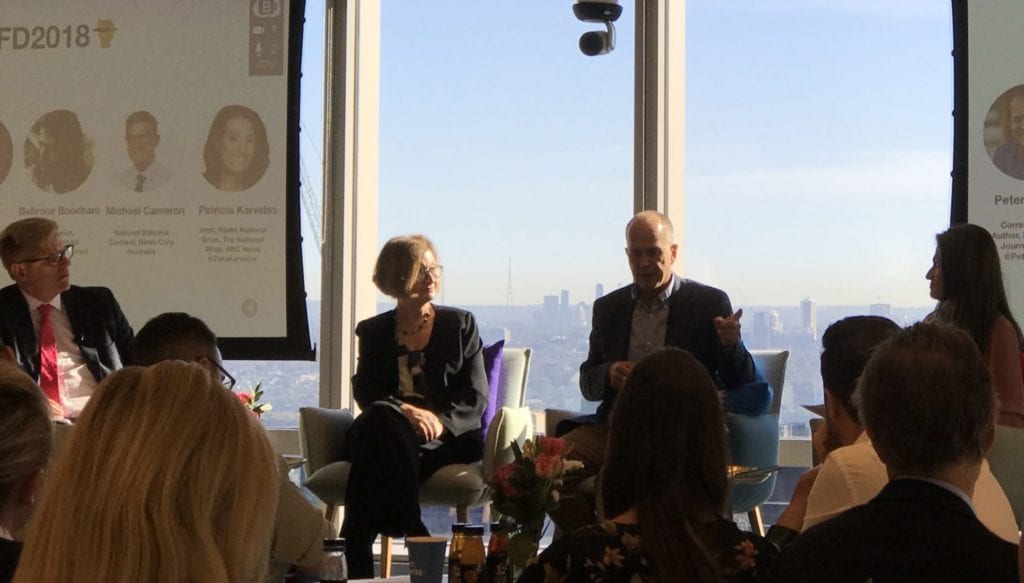In 2017, 262 journalists were imprisoned worldwide. It was a record.
But 2017 also offered a more positive milestone, particularly for women all over the world, brought about through journalism.
That milestone is the start of the #MeToo movement, which fundamentally came about through the Harvey Weinstein story, initially by New York Times investigative reporters Megan Twohey and Jodi Kantor.
As Variety Magazine put it, their work brought about an “industry reckoning” that ultimately led to numerous more powerful names being exposed. They meticulously chronicled the abuses, later working with the New Yorker’s Ronan Farrow to paint “a portrait of a serial predator who was able to use his power to prey on female employees and actresses in methodical fashion.”
Their work has since inspired women all over the world to go public and speak out about sexual harassment, assault and abuse, including in Australia, where we’ve now also seen meticulous, investigative work into a number of high-profile men.
As News Corp’s national editorial counsel Michael Cameron put it this morning, if it wasn’t for journalism, Harvey Weinstein would still be making films today.
But Cameron also added that if the same Weinstein story broke in Australia, Weinstein would probably sue. And, given our heavy-handed defamation laws, he’d probably have a good chance of winning. He described our defamation laws as some of the worst in the world, and a significant impediment to press freedom in Australia.
I’ve said it before. (In my book, actually.) And I’ll say it again. Too often, Australia’s #defamation laws protect the rich and powerful. #metoo #timesup
— Tracey Spicer AM (@TraceySpicer) May 2, 2018
Cameron was speaking on a panel at Twitter’s Australian headquarters to mark World Press Freedom Day, also featuring correspondent Peter Greste, and investigative journalists Kate McClymont and Behrouz Boochani (via video link).
Congratulations to @RyleGerard & @PeterGreste, worthy recipients of @AusPressCouncil‘s Press Freedom Medal on #WorldPressFreedomDay https://t.co/QvhD6qRCuo #PressFreedom #WPFD2018
— Amnesty Australia 🕯 (@amnestyOz) May 3, 2018
Peter Greste, who received the Press Freedom Medal at the event, spoke about his continued advocacy for press freedom.
He said that in Australia media laws are too often used under the guise of national security to cover up what’s politically embarrassing.
Greste added that open public conversations are essential for a democracy, and a rethink is needed on the relationship between media and government. “The government will use the law for whatever purpose they can get away with,” he said.
Greste said a huge social media campaign aided his release from prison in Egypt, but that far too many journalists don’t have the ability to access such significant levels of social pressure.
The panel also noted how difficult, if not impossible, it is for journalists to report on Manus Island, given the $8000 visa request that is required. Kate McClymont said that if your visa is rejected, you don’t get your money back, making it a difficult cost for news organisations to justify.
Our defamation laws have been protecting high profile abusers for too long #WPFD2018 #metoo #TimesUp https://t.co/iZkokNuFEm
— Emma Kersey 🖤🌈 (@Kern_E_Kerney) May 2, 2018
The latest Reporters Without Borders Report outlined concerns that political leaders are encouraging increasing levels of animosity towards journalists.
“More and more democratically elected leaders no longer see the media as part of democracy’s essential underpinning, but as an adversary to which they openly display their aversion,” write the authors of the report.
Please consider the work of journalists this World Press Freedom Day.
The second winner of the Press Freedom Medal is @RyleGerard: “The people who should be getting this honour are the hundreds of journalists who work around the world. We can do better journalism when we work together.” #WorldPressFreedomDay #WPFD2018
— Siobhan Kennedy (@siobhanckennedy) May 2, 2018


